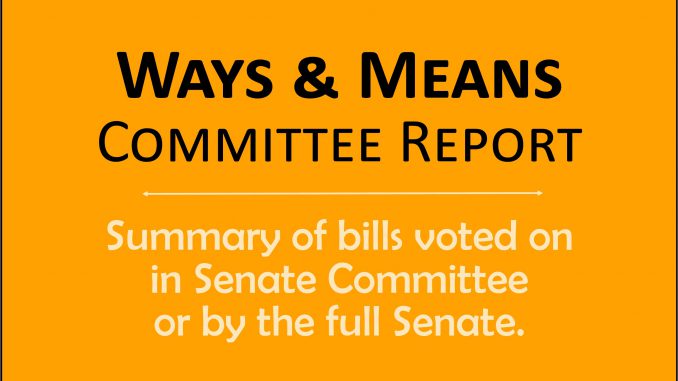
SSB 1059 – Civil court fines and fees
SSB 1098 – Increased expensing for corporations for tax year 2018
COMMITTEE ACTION:
SSB 1059 – Civil court fines and fees
SSB 1059 is similar to legislation passed by the Senate in 2018 (SF 2394) to establish a dedicated funding stream for the Division of Criminal Investigation’s crime lab. This funding will speed up the testing of sexual assault kits, which has been hindered by lack of staff and equipment. SSB 1059 provides more funding for the crime lab and also $9 million in technology money for the Judicial Branch to a dedicated fund that is not subject to appropriations. Under the bill, a percentage of the crime services surcharge that is added to criminal fines will go directly to the crime lab. The remaining criminal surcharge monies kept by the state will continue to go to the Victim Compensation Fund and to the newly created Drug Abuse Resistance Education Fund at the Office of Drug Control Policy.
The current system of fine, fees and surcharges allocates money to the General Fund, along with a number of diversions to existing funds. The bill increases numerous scheduled fines and non-scheduled fines for simple misdemeanors, serious misdemeanors, aggravated misdemeanors, “D” felonies and “C” felonies, as well as increasing certain civil filing fees. The bill also reduces the criminal surcharge that is added to all criminal fines and removes the Law Enforcement Initiative Surcharge, which is added to fines for a specified group of criminal violations. The increase in the criminal fines combined with the reduction in the criminal surcharge from 35 percent to 10 percent provides a slight increase in the total amounts that will be charged to someone who has a criminal conviction with a fine imposed. The increased fine amounts and increased civil filing fees will be deposited into the General Fund, while all of the criminal surcharge amounts will be distributed for specific purposes (cities and counties, victim compensation fund, the crime lab, DARE fund). This proposal is projected to have a neutral impact on General Fund revenues while providing additional funding to the crime lab and DARE education.
[2/6: Short Form (Absent: Danielson)]
SSB 1098 – Increased expensing for corporations for tax year 2018
SSB 1098 relates to Section 179 expensing for S-corporations, C-corporations and other entities taxed as corporations. The bill also impacts individuals filing K-1 returns (members of LLCs, S-Corp, and partnerships) for income earned through those entities. In 2018, SF 2417 (GOP tax bill) raised the Section 179 expensing limit to $70,000/$280,000 annually for individual income taxes only and not for corporate taxpayers. The bill also instituted a K-1 tax form “fix” so that the limit on expensing is extended to every member of the business rather than having all partners cumulatively limited to the expensing threshold.
During rulemaking to implement SF 2417, the department determined that because Section 179 expensing was not raised for corporate taxpayers, the individual taxpayers filing K-1s as a part of an S-corporation (and other corporate taxes entities) were also not eligible for the expanded Section 179 limit that individual income taxpayers were given in SF 2417. Those individuals could only claim up to the previous $25,000/$200,000.
The bill resolves this issue by changing the corporate expensing levels for tax year 2018. Changes for other years were fully addressed in SF 2417. Section 179 expensing levels are increased to $100,000/$250,000 for both individual and corporate returns for tax year 2019. Section 179 and other coupling issues are resolved in tax year 2020 because they instituted “rolling conformity” from then on. Rolling conformity means that applicable federal tax changes on expenses, credit and deductions allowed under Iowa law will automatically be incorporated into Iowa tax code instead of requiring legislative action to implement the changes.
[2/6: Short Form (Absent: Danielson)]
